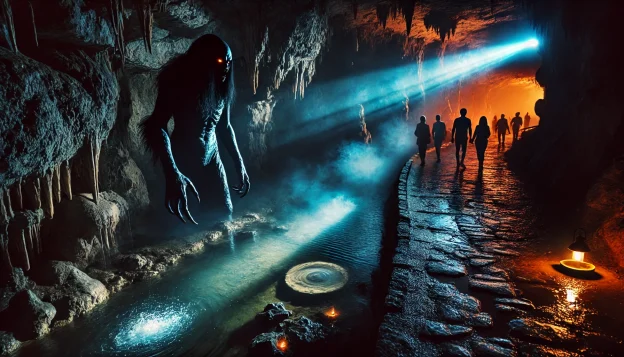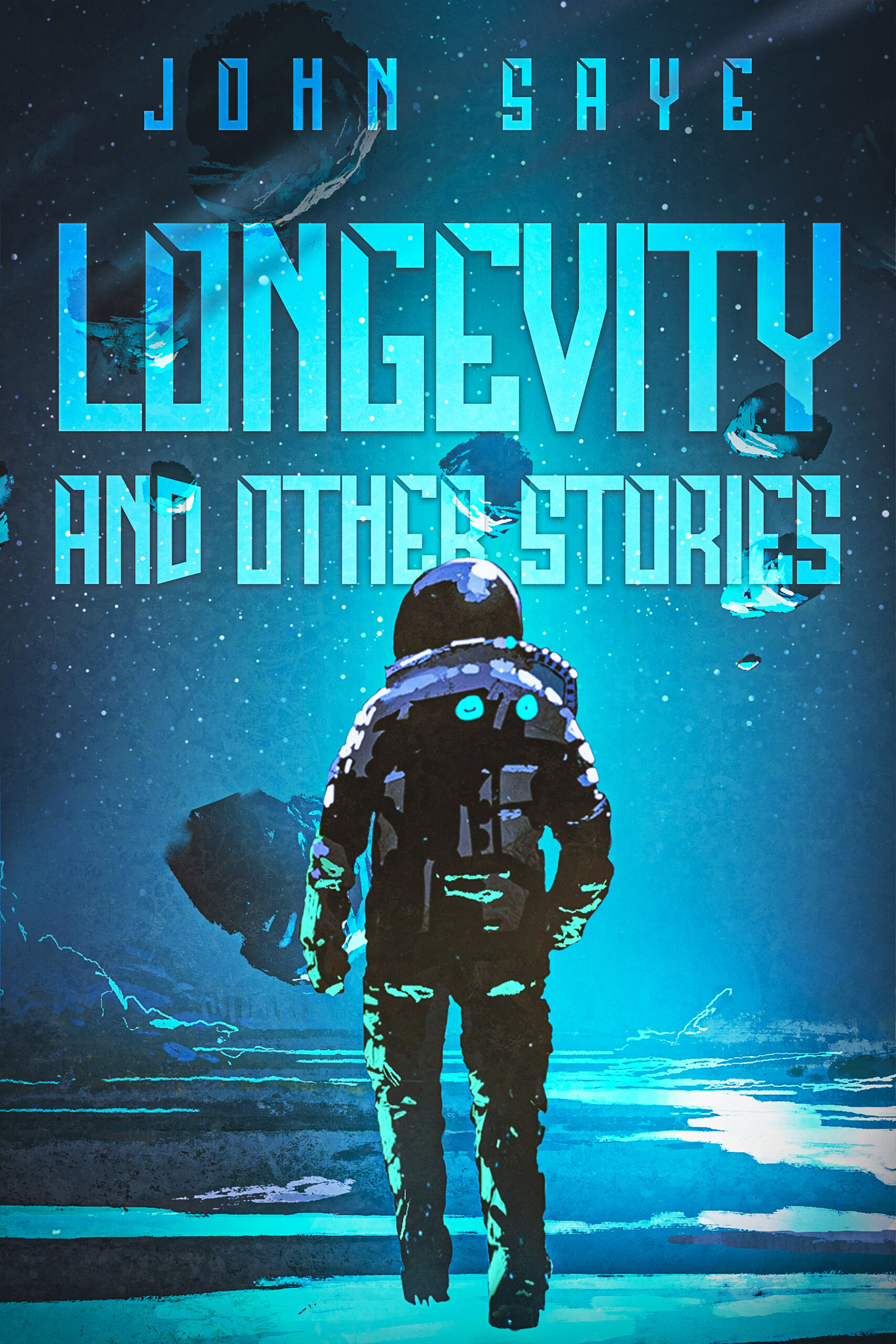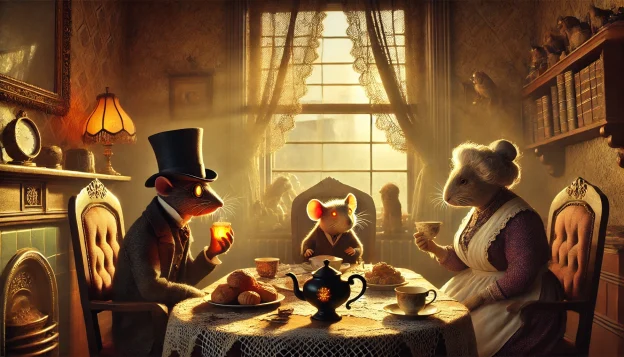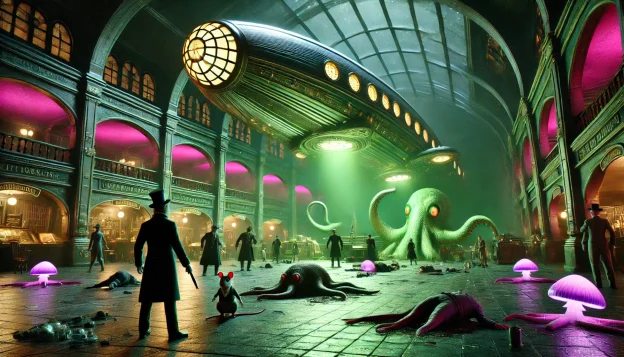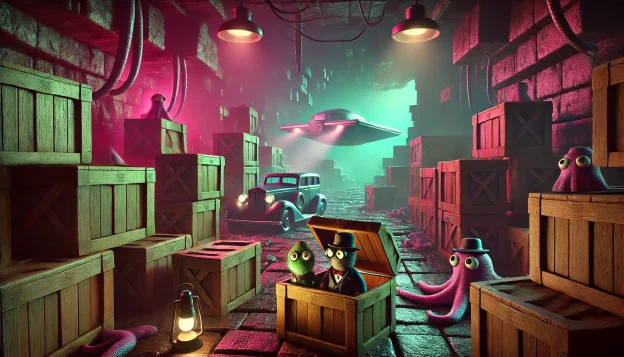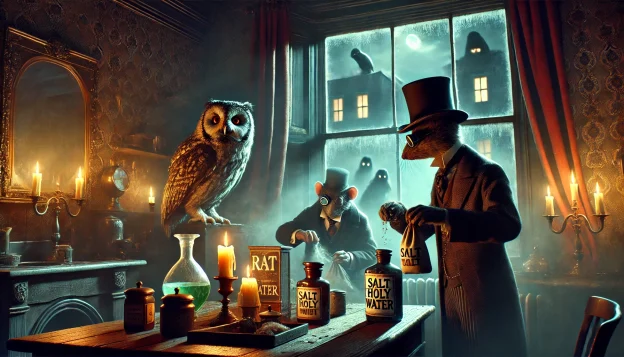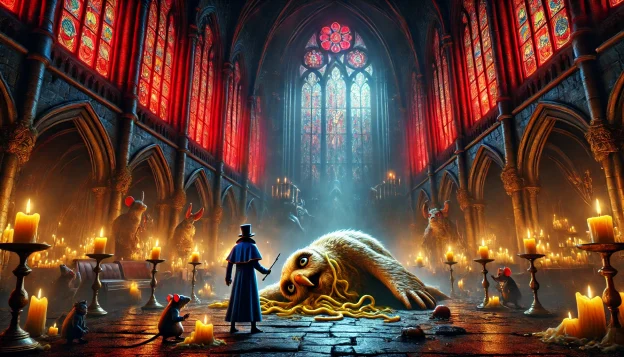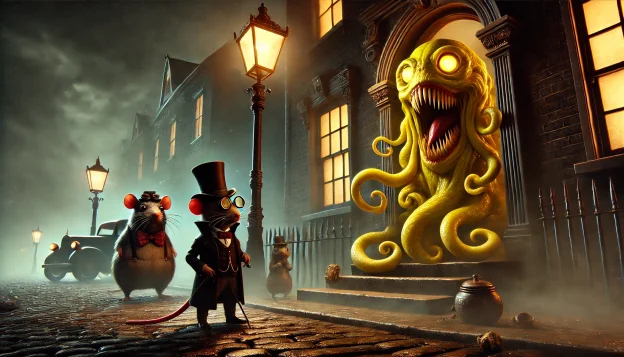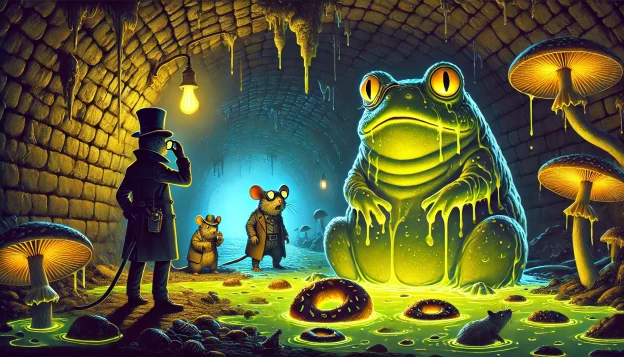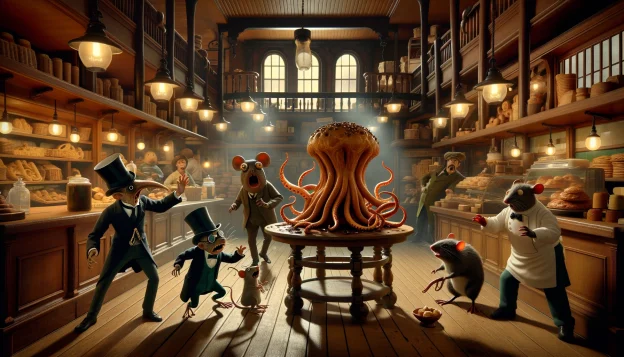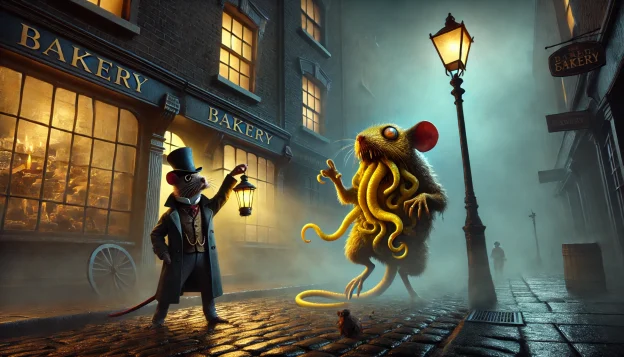This is a draft version of a chapter from John Saye’s book, Longevity and Other Stories. If you are daring, why not subscribe to my newsletter (they come few and far between), and I’ll send you a PDF copy of the book?
“My name is Janet,” she said, opening her arms wide to the twelve people gathered for her tour. They dressed in the standard tourist getup, sneakers, shorts, and probably too much hauled in various backpacks. A couple was old, some young, but they were all there for the same thing.
Janet wore black shorts and a safari shirt with a ranger hat. Thick chestnut hair fell around her shoulders. She wore boots up to her knees. She strapped one of them with a long knife.
“Thank you all for visiting blueberry falls. We’ll be descending in just when the elevator arrives to take us down.”
They stood in the space in the middle of the gift shop. Their elbows brushed the merchandise racks on the floor. Janet smiled, but kept her eyes on the elevator door, trying to will it to pick her up.
“I know it’s a little cramped up here. I’m sorry about that. It’s kind of like the coffee cups, magnets, and buttons that want you to buy them. After we get to the bottom and see the falls, you might just want one of those on the way out.”
A man with a fishing hat on humphed.
Her eyes flicked back to the elevator, but it still wasn’t budging.
She let out a sigh that she hoped no one saw. Let’s see, she thought.
In the front were five children.
“What are your names?”
“Ryan.” He had a bowl haircut or was that a ‘little boy haircut?’ and a striped shirt on.
“Colin.” He was a little blond boy, probably the shortest one there. Blue shirt with angry birds on it.
“Rachael.” She was wearing corduroy pants and a yellow shirt. She had two braided pigtails.
“Ted.” He said it so quickly. He wore black and red sneakers, but he held his elbows, trying to act like he didn’t want to be there.
“Missy.” She was thin, tall, and platinum blond. She wore thin sleek glasses that had a slight cat’s eye corner on them.
Behind them were seven adults, and Janet had zero idea about who belonged to who was there. She reached out with an open, non-threatening hand and swept through each of them.
“Harold,” was the older guy with the hat. He was looking at a birdhouse he didn’t want to put together later.
“Martin,” waved to her. His mustache hung down in huge furry bars on each side of his face. He tugged at his jeans jacket. It looked like he was looking for another patch to add to the back of it. He was fingering through several options.
“Sheila,” she waved, then quickly put her hands down, keeping them tightly together.
“Don,” said another. “I don’t know what I’m doing here.” He brushed his hair back. His eyes sparkled with darkness. What was up with this guy?
“Annie.” She looked at a cuckoo clock on the wall. It was about to strike ten o’clock. Janet wanted that elevator to arrive with the previous group soon, all this game stuff.. she blinked at the clocks herself.
“Robbie,” he was taller than anyone else. Janet wondered how he would do in the short spot. There were a couple of tight spaces. He waved. He was confident.
“Samantha,” she was wearing red overalls and a long sleeve black t-shirt, long bright, obnoxious pink hair down to her waist.
“Hi, Samantha. I think our elevator is almost here.”
“Why can’t we just go down on our own?” asked Martin.
“Well, it’s a guided tour. It is possible to get lost and on the wrong path down there. Besides, it’s down so far in the ground before it becomes walkable. Where all the cool stuff to look at is where stuff is lit up.”
Ding.
The doors from the elevator opened with a stutter. Sometimes they didn’t want to go all the way.
“Okay, Great, come on, folks. This way to the Blueberry Falls.”
Could we feel there first? She opened her arms and carefully guided her people toward the doors as the previous troop came back up. They passed right through Janet’s group, and right as the previous guide passed Janet, bumping her shoulder back while looking her in the eye, chaos ensued as every crazy clock on the wall started chiming. Three cell phones and the noise from ten cuckoo clocks, five Beatles commemorative clocks singing Hey Jude, and thirteen alarm clocks that lit up and appeared to spill water in an illusion from a pipe at the top designed to look like the falls all went off at once.
Janet couldn’t hear herself think.
Someone asked her a question, she thought, but she couldn’t hear it. What she said was “I’m sorry,” even if all the kids saw was lips moving. What she thought was a lot different.
The elevator was now clear and most of the last crew was out. She looked back at the other guide. He wasn’t looking at her. She called him names in her mind, closed her eyes, and waited for the noise to die down as the doors closed.
“Okay folks, here we go.”
Lights slid back and forth as they descended. It wasn’t like any actual lights or anything was sliding by, but we built them into the door, and Janet had long forgotten they were even there.
“Is it true there’s a monster?” said one kid.
“That’s bullshit,” said one adult.
“Excuse me,” said Janet. “There’s no truth to those rumors. There might be a raccoon or possibly a bear on certain levels, but not anywhere near where we are going.”
“No monster then?”
“Not unless you consider bats monsters, I guess.”
“Not really,” said one.
“Bats are boring,” said another.
“We’re getting close. Almost there. In the caves, you’ll see stalactites, stalagmites, and everything in between. We’ll pass several lit structures and lots of natural limestones, and if you’re smart, you might even notice where the old stairs are. We don’t use them anymore, except in times of emergency, but trust me, they are there.”
“Did you ever have to climb them?” said the guy with the mustache from heck.
“Yes sir, everyone on the team has to climb them once a year, and when they first start and lead groups up, when the elevator is out. You can purchase a ticket to climb down into the caverns on them if you’re interested. It’s an interesting tour, and you can see some things you don’t normally see.”
“Anyone ever take that?” said the guy in the angler’s hat.
“Rarely.”
The doors opened, and she took them out. “This is what we call the grand foyer.”
“It’s dark. Why do you call it that?”
The light slowly rose, and everyone could see. “As you can see, it’s four stories tall at this point and is a large area, big enough for tours and a great starting point. We can go in two directions from here, but I’ll be taking you this way today.”
The lights went down one path, slightly pink. “This way everyone.”
One kid, the girl with the pink hair, saw behind them at the side of the elevator a set of stairs, concrete, but stained so they blended in. It was lit up with exit signs here and there.
“If I was a monster. I’d sure hide down here. This would be the perfect place,” said Samantha.
“I assure you, the most interesting thing you’ll see there here might be a rat gone wrong, but since there’s not much food this far down for them, there’s little chance of that.”
They passed under an arch. Janet stepped them through a careful spot where the ceiling was only five feet high. Robbie put his hand up and felt the cave ceiling as they went through, and stooped. They could all tear up and hear the rush of water somewhere in the distance echoing through the caves.
“To your left, you’ll see Frankie’s elephant.”
One kid watched Janet hit a switch on a remote control that softly brought the lights up to the left. There was a bar on each side of the path so you couldn’t, or at least weren’t supposed to climb up there, but on a ledge, fourteen feet up was a formation of cave rock that resembled a large elephant, glowing with soft turquoise light.
Water dripped around.
“I could hide behind that if I was a monster,” said one of them in the darkness.
“I heard that. Yes, the creature hides in this series of caves to the right, behind us all the time,” said Janet.
She brought up big spots, and they all spun around to see a couple of caves about ten feet up with deep shadows.
“Don’t say that.”
“Nope, just people I guess, still no creature. Nothing.” She waved them forward. “Blueberry Falls this way, folks. We’re almost there.”
She led them through, around the corner, towards the falls in the distance. Once they’d all made it out of the room safely, the lights faded on the Great elephant. Then the blue lights faded on in the next chamber.
All was quiet.
The lights dimmed back down to the lights along the sides of the footpath. Soft orange.
Drip.
Drip.
Something landed on the floor in some footlights. It lived in shadow, and breathed like a ninja, barely whispering as it took huge breaths that took three minutes a piece. It was tall, dark, and scraped the floor ever-so-slightly as it clicked down the path and jumped into a side path like a rabbit.
“This way folks,” said Janet. “The tour is headed this way. Yes, right over here.” She mentally counted her twelve people as she brought them into reflecting pool number one. The path wound through the caves left and right. On the left and the right of the path were three feet of pool, lit with various underwater lamps. The bottom of the pool glittered with coins. Some of the twelve tossed in theirs. One of them complained as he did it.
“Tossing coins is, of course, not mandatory, but the luck of the caves will follow you home, or if you do.”
More coins splash into the fountain in the dark.
Somewhere it sounded like a foot
Somewhere it sounded like a foot splashed into the fountain.
“What was that?”
“This way folks, around the corner, we’re almost there,” said Janet.
“I thought I heard something,”
“A splash.”
“I don’t know. Maybe it was down the hall, where the big falls are.”
“I thought it was behind us.”
“Daddy?”
A flock of bats came through, covering the noise of what Janet thought were more plunks in the water, to be sure.
Kids were screaming, but a second later it was over.
“This way, folks.”
Ten minutes later, having seen the falls, such as they were, the twelve left through the gift shop, not returning Janet’s smile as they passed the coffee cups, badges, and clocks behind.
She smiled and waved, trying not to be like her counterpart earlier, but they streamed out anyway, clearly all on their way somewhere else. She heard the words fudge shop and lunch before the whole place started chiming eleven o’clock and drove her out into the parking lot as well.
Glenda, behind the register, who hadn’t been able to hear for years anyway, just sat through it.
“Why do I always come up right then?” said Janet.
